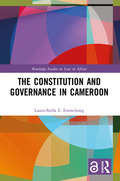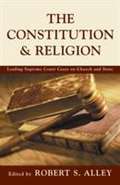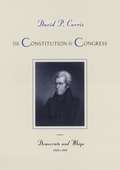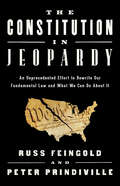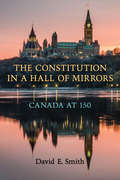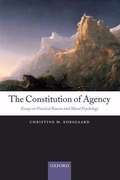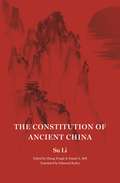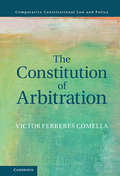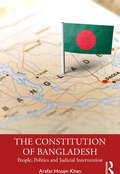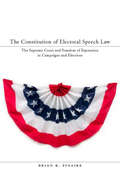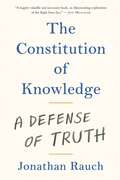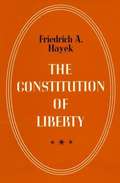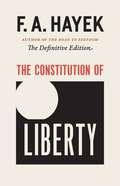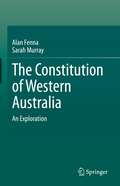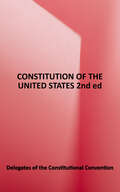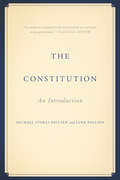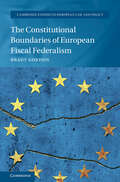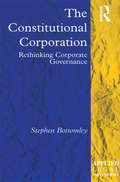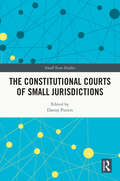- Table View
- List View
The Constitution and Governance in Cameroon (Routledge Studies on Law in Africa)
by Laura-Stella E. EnonchongThis book provides a systematic analysis of the major structural and institutional governance mechanisms in Cameroon, critically analysing the constitutional and legislative texts on Cameroon’s semi-presidential system, the electoral system, the legislature, the judiciary, the Constitutional Council and the National Commission on Human Rights and Freedoms. The author offers an assessment of the practical application of the laws regulating constitutional institutions and how they impact on governance. To lay the groundwork for the analysis, the book examines the historical, constitutional and political context of governance in Cameroon, from independence and reunification in 1960–1961, through the adoption of the 1996 Constitution, to more recent events including the current Anglophone crisis. Offering novel insights on new institutions such as the Senate and the Constitutional Council and their contribution to the democratic advancement of Cameroon, the book also provides the first critical assessment of the legislative provisions carving out a special autonomy status for the two Anglophone regions of Cameroon and considers how far these provisions go to resolve the Anglophone Problem. This book will be of interest to scholars of public law, legal history and African politics.
The Constitution and Religion: Leading Supreme Court Cases on Church and State
by Robert S. AlleyA comprehensive look at the Supreme Court's decisions regarding the separation of Church and State.
The Constitution and the Future of Criminal Justice in America
by John T. Parry L. Song RichardsonThe Constitution and the Future of Criminal Justice in America brings together leading scholars from law, psychology and criminology to address timely and important topics in US criminal justice. The book tackles cutting-edge issues related to terrorism, immigration and transnational crime, and to the increasingly important connections between criminal law and the fields of social science and neuroscience. It also provides critical new perspectives on intractable problems such as the right to counsel, race and policing, and the proper balance between security and privacy. By putting legal theory and doctrine into a concrete and accessible context, the book will advance public policy and scholarly debates alike. This collection of essays is appropriate for anyone interested in understanding the current state of criminal justice and its future challenges.
The Constitution in Congress: Democrats and Whigs 1829-1861
by David P. CurrieThe Constitution in Congress series has been called nothing less than a biography of the US Constitution for its in-depth examination of the role that the legislative and executive branches have played in the development of constitutional interpretation. This third volume in the series, the early installments of which dealt with the Federalist and Jeffersonian eras, continues this examination with the Jacksonian revolution of 1829 and subsequent efforts by Democrats to dismantle Henry Clay's celebrated "American System" of nationalist economics. David P. Currie covers the political events of the period leading up to the start of the Civil War, showing how the slavery question, although seldom overtly discussed in the debates included in this volume, underlies the Southern insistence on strict interpretation of federal powers. Like its predecessors, The Constitution in Congress: Democrats and Whigs will be an invaluable reference for legal scholars and constitutional historians alike.
The Constitution in Congress: Democrats and Whigs, 1829–1861
by David P. CurrieThe Constitution in Congress series has been called nothing less than a biography of the US Constitution for its in-depth examination of the role that the legislative and executive branches have played in the development of constitutional interpretation. This third volume in the series, the early installments of which dealt with the Federalist and Jeffersonian eras, continues this examination with the Jacksonian revolution of 1829 and subsequent efforts by Democrats to dismantle Henry Clay’s celebrated “American System” of nationalist economics. David P. Currie covers the political events of the period leading up to the start of the Civil War, showing how the slavery question, although seldom overtly discussed in the debates included in this volume, underlies the Southern insistence on strict interpretation of federal powers. Like its predecessors, The Constitution in Congress: Democrats and Whigs will be an invaluable reference for legal scholars and constitutional historians alike.
The Constitution in Jeopardy: An Unprecedented Effort to Rewrite Our Fundamental Law and What We Can Do About It
by Russ Feingold Peter PrindivilleA former U.S. senator joins a legal scholar to examine a hushed effort to radically change our Constitution, offering a warning and a way forward.Over the last two decades, a fringe plan to call a convention under the Constitution's amendment mechanism—the nation's first ever—has inched through statehouses. Delegates, like those in Philadelphia two centuries ago, would exercise nearly unlimited authority to draft changes to our fundamental law, potentially altering anything from voting and free speech rights to regulatory and foreign policy powers. Such a watershed moment would present great danger, and for some, great power.In this important book, Feingold and Prindiville distill extensive legal and historical research and examine the grave risks inherent in this effort. But they also consider the role of constitutional amendment in modern life. Though many focus solely on judicial and electoral avenues for change, such an approach is at odds with a cornerstone ideal of the Founding: that the People make constitutional law, directly. In an era defined by faction and rejection of long-held norms, The Constitution in Jeopardy examines the nature of constitutional change and asks urgent questions about what American democracy is, and should be.
The Constitution in a Hall of Mirrors: Canada at 150
by David E. SmithWhether it’s the first-past-the-post electoral system or partisan government appointees to the Senate, Canadians want better representation and accountability from the federal government. Before reforms can be enacted, however, it is important to explore and clarify the relationships among Canada’s three parliamentary institutions: Crown, Senate, and Commons. In The Constitution in a Hall of Mirrors, David E. Smith presents a learned but accessible analysis of the interconnectedness of Canada’s parliamentary institutions. Smith argues that Parliament is a unity comprised of three parts and any reforms made to one branch will, whether intended or not, affect the other branches. Through a timely, nuanced, and comprehensive examination of parliamentary debates, committee reports, legal scholarship, and comparative analysis of developments in the United Kingdom, Smith uncovers the substantial degree of ambiguity that exists among Canadians and their calls for structural and operational reforms. By illuminating the symbiotic relationship between the Crown, Senate, and Commons, The Constitution in a Hall of Mirrors brings government reform closer to reality.
The Constitution of Agency: Essays on Practical Reason and Moral Psychology
by Christine M. KorsgaardChristine M. Korsgaard is one of today's leading moral philosophers: this volume collects ten influential papers by her on practical reason and moral psychology. Korsgaard draws on the work of important figures in the history of philosophy such as Plato, Aristotle, Kant, and Hume, showing howtheir ideas can inform the solution of contemporary and traditional philosophical problems, such as the foundations of morality and practical reason, the nature of agency, and the role of the emotions in action. In Part 1, The Principles of Practical Reason , Korsgaard defends the view that the principles of practical reason are constitutive principles of action. By governing our actions in accordance with Kant's categorical imperative and the principle of instrumental reason, she argues, we take control ofour own movements and so render ourselves active, self-determining beings. She criticizes rival attempts to give a normative foundation to the principles of practical reason, challenges the claims of the principle of maximizing one's own interests to be a rational principle, and argues for some deepcontinuities between Plato's account of the connection between justice and agency and Kant's account of the connection between autonomy and agency. In Part II, Moral Virtue and Moral Psychology , Korsgaard takes up the question of the role of our more passive or receptive faculties - our emotions and responses - in constituting our agency. She sketches a reading of the Nicomachean Ethics , based on the idea that our emotions can serve asperceptions of good and evil, and argues that this view of the emotions is at the root of the apparent differences between Aristotle and Kant's accounts of morality. She argues that in fact, Aristotle and Kant share a distinctive view about the locus of moral value and the nature of human choicethat, among other things, gives them account of what it means to act rationally that is superior to other accounts. In Part III, Other Reflections , Korsgaard takes up question how we come to view one another as moral agents in Hume's philosophy. She examines the possible clash between the agency of the state and that of the individual that led to Kant's paradoxical views about revolution. And finally, shediscusses her methodology in an account of what it means to be a constructivist moral philosopher. The essays are united by an introduction in which Korsgaard explains their connections to each other and to her current work.
The Constitution of Ancient China (The Princeton-China Series)
by Daniel A. Bell Edmund Ryden Su Su Li Zhang YongleHow was the vast ancient Chinese empire brought together and effectively ruled? What are the historical origins of the resilience of contemporary China's political system? In The Constitution of Ancient China, Su Li, China's most influential legal theorist, examines the ways in which a series of fundamental institutions, rather than a supreme legal code upholding the laws of the land, evolved and coalesced into an effective constitution.Arguing that a constitution is an institutional response to a set of issues particular to a specific society, Su Li demonstrates how China unified a vast territory, diverse cultures, and elites from different backgrounds into a whole. He delves into such areas as uniform weights and measurements, the standardization of Chinese characters, and the building of the Great Wall. The book includes commentaries by four leading Chinese scholars in law, philosophy, and intellectual history--Wang Hui, Liu Han, Wu Fei, and Zhao Xiaoli—who share Su Li's ambition to explain the resilience of ancient China's political system but who contend that he overstates functionalist dimensions while downplaying the symbolic. Exploring why China has endured as one political entity for over two thousand years, The Constitution of Ancient China will be essential reading for anyone interested in understanding the institutional legacy of the Chinese empire.
The Constitution of Arbitration (Comparative Constitutional Law and Policy)
by Victor Ferreres ComellaThis work is the first systematic discussion of arbitration from a constitutional perspective, covering the most important types of arbitration, including domestic arbitration in private law, international commercial arbitration, investment treaty arbitration, and state-to-state arbitration. Victor Ferreres Comella argues for the recognition of a constitutional right to arbitration in the private sphere and discusses the constraints that the state is entitled to place on this right. He also explores the conditions under which investment treaty arbitration is constitutionally legitimate, and highlights the shortcomings of international adjudication from a constitutional perspective. The rich landscape of arbitration is explained in clear language, avoiding unnecessary technical jargon. Using examples drawn from a wide variety of domains, Ferreres bridges the gap between constitutional and arbitral theory.
The Constitution of Bangladesh: People, Politics and Judicial Intervention
by Arafat Hosen KhanThe book provides a comprehensive introduction to the Constitution of Bangladesh. It traces the sociopolitical and legal context of its birth in the aftermath of a violent Independence War, through to the seventeen amendments to date as Bangladesh evolved through military coups and dictatorships, shifting alliances between religious and political parties, and the emergence of development state. Aimed at readers who are keen to understand the underpinnings of the constitutional system, its evolution, and the politics behind the scenes, the book will explore the impact of political bargains and extra-legal developments on the evolution of the Constitution instead of treating it as a standalone doctrine. By focusing on the overall sociopolitical context up until 2020, the book departs from the dominant tendency in legal scholarship to restrict attention to the development of the Constitution from its inception to the modern day. The volume will be of great interest to scholars and researchers of law, politics and South Asian studies.
The Constitution of Electoral Speech Law: The Supreme Court and Freedom of Expression in Campaigns and Elections
by Brian PinaireBush v. Gore brought to the public's attention the significance of election law and the United States Supreme Court's role in structuring the rules that govern how campaigns and elections function in America. In this book, Brian K. Pinaire examines one expanding domain within this larger legal context: freedom of speech in the political process, or, what he terms, electoral speech law. Specifically, Pinaire examines the Court's evolving conceptions of free speech in the electoral process and then traces the consequences of various debates and determinations from the post-World War II era to the present. In his analysis of the broad range of cases from this period, supplemented by four recent case study investigations, Pinaire explores competing visions of electoral expression in the marketplace of ideas, various methods for analyzing speech dilemmas, the multiple influences that shape the justices' notions of both the potential for and privileged status of electoral communication, and the ultimate implications of these Court rulings for American democracy.
The Constitution of Knowledge: A Defense of Truth
by Jonathan Rauch“In what could be the timeliest book of the year, Rauch aims to arm his readers to engage with reason in an age of illiberalism.” —Newsweek A New York Times Book Review Editors' Choice Disinformation. Trolling. Conspiracies. Social media pile-ons. Campus intolerance. On the surface, these recent additions to our daily vocabulary appear to have little in common. But together, they are driving an epistemic crisis: a multi-front challenge to America’s ability to distinguish fact from fiction and elevate truth above falsehood. In 2016 Russian trolls and bots nearly drowned the truth in a flood of fake news and conspiracy theories, and Donald Trump and his troll armies continued to do the same. Social media companies struggled to keep up with a flood of falsehoods, and too often didn’t even seem to try. Experts and some public officials began wondering if society was losing its grip on truth itself. Meanwhile, another new phenomenon appeared: “cancel culture.” At the push of a button, those armed with a cellphone could gang up by the thousands on anyone who ran afoul of their sanctimony. In this pathbreaking book, Jonathan Rauch reaches back to the parallel eighteenth-century developments of liberal democracy and science to explain what he calls the “Constitution of Knowledge”—our social system for turning disagreement into truth. By explicating the Constitution of Knowledge and probing the war on reality, Rauch arms defenders of truth with a clearer understanding of what they must protect, why they must do—and how they can do it. His book is a sweeping and readable description of how every American can help defend objective truth and free inquiry from threats as far away as Russia and as close as the cellphone.
The Constitution of Liberty
by Friedrich A. HayekIn this classic work Hayek restates the ideals of freedom that he believes have guided, and must continue to guide, the growth of Western civilization. Hayek's book, first published in 1960, urges us to clarify our beliefs in today's struggle of political ideologies.
The Constitution of Liberty: The Definitive Edition
by Friedrich A. Hayek edited by Ronald HamowyFrom the $700 billion bailout of the banking industry to president Barack Obama's $787 billion stimulus package to the highly controversial passage of federal health-care reform, conservatives and concerned citizens alike have grown increasingly fearful of big government. Enter Nobel Prize-winning economist and political theorist F. A. Hayek, whose passionate warning against empowering states with greater economic control, The Road to Serfdom, became an overnight sensation last summer when it was endorsed by Glenn Beck. The book has since sold over 150,000 copies. The latest entry in the University of Chicago Press's series of newly edited editions of Hayek's works, The Constitution of Liberty is, like Serfdom, just as relevant to our present moment. The book is considered Hayek's classic statement on the ideals of freedom and liberty, ideals that he believes have guided--and must continue to guide--the growth of Western civilization. Here Hayek defends the principles of a free society, casting a skeptical eye on the growth of the welfare state and examining the challenges to freedom posed by an ever expanding government--as well as its corrosive effect on the creation, preservation, and utilization of knowledge. In opposition to those who call for the state to play a greater role in society, Hayek puts forward a nuanced argument for prudence. Guided by this quality, he elegantly demonstrates that a free market system in a democratic polity--under the rule of law and with strong constitutional protections of individual rights--represents the best chance for the continuing existence of liberty. Striking a balance between skepticism and hope, Hayek's profound insights are timelier and more welcome than ever before. This definitive edition of The Constitution of Liberty will give a new generation the opportunity to learn from his enduring wisdom.
The Constitution of Risk
by Adrian VermeuleThe Constitution of Risk is the first book to combine constitutional theory with the theory of risk regulation. The book argues that constitutional rulemaking is best understood as a means of managing political risks. Constitutional law structures and regulates the risks that arise in and from political life, such as an executive coup or military putsch, political abuse of ideological or ethnic minorities, or corrupt self-dealing by officials. The book claims that the best way to manage political risks is an approach it calls "optimizing constitutionalism" - in contrast to the worst-case thinking that underpins "precautionary constitutionalism," a mainstay of liberal constitutional theory. Drawing on a broad range of disciplines such as decision theory, game theory, welfare economics, political science, and psychology, this book advocates constitutional rulemaking undertaken in a spirit of welfare maximization, and offers a corrective to the pervasive and frequently irrational attitude of distrust of official power that is so prominent in American constitutional history and discourse.
The Constitution of Western Australia: An Exploration
by Sarah Murray Alan FennaThis book provides the first comprehensive introduction to, and enquiry into, the rules of Western Australia’s (WA) system of government. The WA Constitution is not well known or understood ― or even easy to identify ― and this book provides an essential guide. It brings academic expertise and careful scholarship to the exploration of sometimes complex constitutional issues in a way that will be invaluable for those with specialist interest in constitutional law and government while also being engaging and accessible for a wider audience. In doing so, it combines authorial expertise from constitutional law and political science — something essential to a well-rounded understanding of the simultaneously legal and political nature of a Constitution.
The Constitution of the Commonwealth of Australia
by Nicholas Aroney Nicholas Aroney Peter Gerangelos Sarah Murray James Stellios Peter Gerangelos Sarah MurrayThe Constitution of the Commonwealth of Australia examines the body of constitutional jurisprudence in an original and rigorous yet accessible way. It begins by exploring the historical and intellectual context of ideas surrounding the Constitution's inception, and closely examines its text, structure, principles and purposes in that light. The book then unpacks and critically analyses the High Court's interpretation of the Constitution in a manner that follows the Constitution's own logic and method of organisation. Each topic is defined through detailed reference to the existing case law, which is set out historically to facilitate an appreciation of the progressive development of constitutional doctrine since the Constitution came into force in 1901. The Constitution of the Commonwealth of Australia provides an engaging and distinctive treatment of this fundamental area of law. It is an excellent book for anyone seeking to understand the significance and interpretation of the Constitution.
The Constitution of the United States
by William Baude Michael Paulsen Michael McConnell Samuel BrayThis casebook emphasizes the text, structure, and history of the Constitution. It uses "great cases" for learning the major issues in constitutional law, and it gives less attention to small ripples of contemporary doctrine. It emphasizes the task of interpretation, including many examples of the interpretation of the Constitution by the political branches. And it includes features of our constitutional history that are neglected in many casebooks, such as slavery, the amendment process, and the early history of the freedom of speech. The fourth edition has many refinements. It also has new cases on (among other topics) the non-delegation doctrine, legislative investigations, presidential removal, compelled speech, and the free exercise of religion, and new old cases on Article III and on the commerce power. There are also new executive and legislative materials on various topics, including impeachment and the drafting of the Bill of Rights.
The Constitution of the United States: With Index, and the Declaration of Independence
by Delegates of the Constitutional ConventionThe Constitution of the United States, with Index, and The Declaration of Independence: Pocket Edition This Constitution was proofed word for word against the original Constitution housed in the Archives in Washington, D.C. It is identical in spelling, capitalization, and punctuation. It is sized in accordance with one produced by President Thomas Jefferson and includes the Bill of Rights, Amendments 11 through 27, The Declaration of Independence and a complete index of the Constitution. 52 pages. 3-1/4 x 6-1/2 inches. Published by the National Center for Constitutional Studies, a nonprofit educational foundation dedicated to restoring Constitutional principles in the tradition of America's Founding Fathers.
The Constitution: An Introduction
by Luke Paulsen Michael PaulsenFrom war powers to health care, freedom of speech to gun ownership, religious liberty to abortion, practically every aspect of American life is shaped by the Constitution. This vital document, along with its history of political and judicial interpretation, governs our individual lives and the life of our nation. Yet most of us know surprisingly little about the Constitution itself, and are woefully unprepared to think for ourselves about recent developments in its long and storied history.The Constitution: An Introduction is the definitive modern primer on the US Constitution. Michael Stokes Paulsen, one of the nation's most provocative and accomplished scholars of the Constitution, and his son Luke Paulsen, a gifted young writer and lay scholar, have combined to write a lively introduction to the supreme law of the United States, covering the Constitution's history and meaning in clear, accessible terms.Beginning with the Constitution's birth in 1787, Paulsen and Paulsen offer a grand tour of its provisions, principles, and interpretation, introducing readers to the characters and controversies that have shaped the Constitution in the 200-plus years since its creation. Along the way, the authors provide correctives to the shallow myths and partial truths that pervade so much popular treatment of the Constitution, from school textbooks to media accounts of today's controversies, and offer powerful insights into the Constitution's true meaning.A lucid and engaging guide, The Constitution: An Introduction provides readers with the tools to think critically and independently about constitutional issues-a skill that is ever more essential to the continued flourishing of American democracy.
The Constitution: Our Written Legacy
by Joseph A. MeluskyHelps students study constitutional principles, issues, and applications in some depth, and to better understand the importance of the document in contemporary times, this book contains excerpts from the Federalist Papers, some landmark Supreme Court opinions, and the texts of some important documents including the Magna Carta, the Declaration of Independence, the Bill of Rights, and others.
The Constitutional Boundaries of European Fiscal Federalism (Cambridge Studies in European Law and Policy)
by Brady GordonThis book bridges the study of European constitutionalism with the study of 'fiscal federalism' – the subfield of public economics concerned with structuring public finances between different levels of government in federal states. On one axis, this book delves into European Union and Member State constitutional law from all EU Member States in order to investigate and identify the existence of permanent constitutional boundaries that will impinge upon the selection of proposed models for EU fiscal federalism. On the second axis, this book engages the study of fiscal federalism in order to determine which institutional configurations known to that field remain legally and economically implementable within those boundaries. It provides a far-reaching investigation of which models of fiscal federalism are compatible with the constitutional boundaries of the European legal order.
The Constitutional Corporation: Rethinking Corporate Governance (Applied Legal Philosophy)
by Stephen BottomleyCorporate laws are based on the idea that the interests of shareholders should be the primary concern of company directors. However, some argue that the proper role for shareholders is to sit back and let the corporation's managers do their job, or that the pursuit of shareholders' interests detracts from the concerns of employees or victims of corporate wrongdoing or other stakeholders. Stephen Bottomley argues that instead of consigning shareholders to this passive role, they should be given opportunities to be active members of corporations. Corporations are constitutional arrangements rather than mere contractual agreements. They are decision-making organizations in which questions of process and structure are important. Thus, instead of using economic criteria such as efficiency as the sole measure for deciding what constitutes 'good' corporate governance, this book examines whether ideas of accountability, deliberation and contestability provide a valuable framework for assessing corporate structures and process and for encouraging greater shareholder participation.
The Constitutional Courts of Small Jurisdictions (Small State Studies)
by Danny PietersThe Constitutional Courts of Small Jurisdictions identifies features and challenges common to the constitutional courts of small state jurisdictions in Europe.The constitutional courts of the following small state jurisdictions are explored: Andorra, Cyprus, Estonia, Liechtenstein, Luxembourg, Malta, Monaco, Montenegro, and San Marino. For each country’s constitutional court, the following matters are examined: the history of the court; its composition; its standing and the types of proceedings; jurisdiction of the court; procedural steps and rules; the nature and effect of the decisions rendered; relations with other courts (CJEU, ECHR, etc.); and current issues and future developments. The book concludes by identifying some common features and challenges that constitutional courts of small states are confronted with, formulating recommendations for other small state jurisdictions across the world.This book will be of great interest and use to practitioners and scholars working in and researching constitutional law in general, and constitutional courts in particular. It will be invaluable for those dealing with small states, as it pays attention to an often forgotten - but important - aspect of the rule of law, and thus also of democracy.
